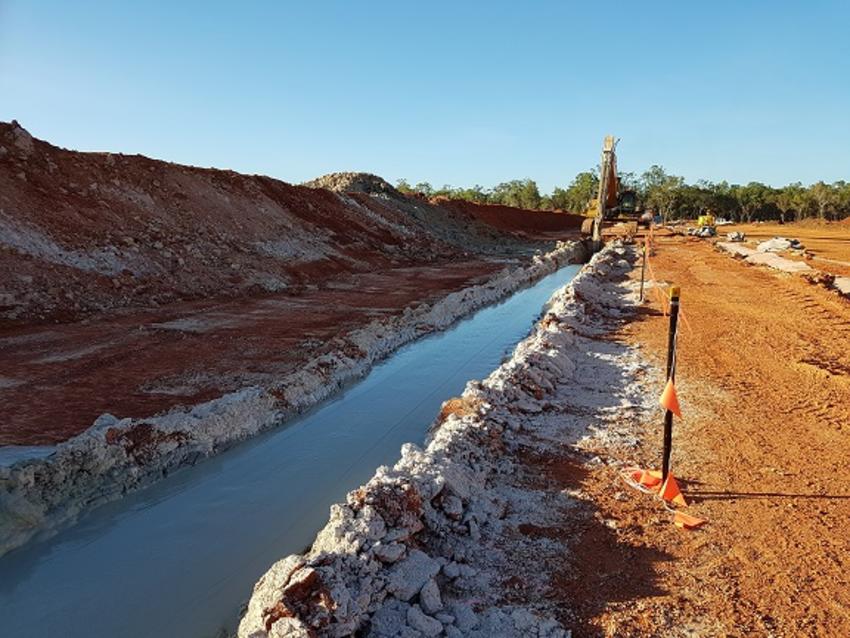Keller Australia has received overwhelming praise after successfully completing foundation works on the Arraw Dam – vital infrastructure for Rio Tinto as it expands its mining operations in northern Australia.

Rio Tinto has mined bauxite at Weipa, northern Queensland, for more than 50 years. Now the company is extending its operations with a new mine nearby that, once operational, will generate A$1.3 billion a year for the economy and support more than a thousand jobs.
Around US$2 billion is being invested in the mine’s infrastructure, which includes roads, a port, a ferry terminal and a processing plant.
Bauxite processing requires huge amounts of water, so last year a vast 24,000,000m3 fresh water dam (equivalent to 9,600 Olympic swimming pools) was constructed under the management of engineering company Bechtel. And it was Keller that played a crucial role in the dam’s development.
The pressure’s on...
“To prevent water seeping beneath the dam, the project called for a cut-off wall to be built,” explains Keller Senior Project Engineer Mathias Delapille. “We were awarded the contract not only because we’re a preferred supplier of Bechtel and a have a good reputation with them, but also because we could give them the confidence in terms of project deliverability and quality.
“The project involved constructing a 22,000m2 cement-bentonite slurry wall, 2.3km long, 800mm wide and to depths of 7-13m. The main challenge, however, was the demanding schedule. The region is subject to wet and dry seasons, so all the work, including the construction of the dam, had to be done in one dry season, which runs from mid-May to early December.
“That’s a lot of work in a short period of time, so the project demanded a high level of coordination across all on-site activities. Essentially, we needed to make sure we did a high-quality job without causing any delays.”
With the site’s remote location, that meant careful logistical planning to ensure everything was delivered on time, and detailed mitigation plans should any problems occur.
Proactive, flexible and ready to meet any challenge
Starting in mid-May 2017, in humid conditions and 40ºC heat, the Keller crew worked in solid three-week shifts to ensure the programme stayed on schedule. Health and safety is always a priority, so a process was in place to ensure no one suffered from fatigue.
One of the main challenges for the team was high levels of over break, with slurry disappearing into the ground’s macro pores. “Obviously this caused concern for us and Bechtel because of the potential for delay and the need to use more product,” says Mathias. “But we reacted very quickly and, thanks to a joint effort with Bechtel’s logistic team, we were able to work with our suppliers to accelerate delivery schedules from Brisbane and remain on schedule ourselves.
“Overall we’ve been very proactive from the start, finding solutions to whatever challenges came up. For example, the typical set-up for a slurry wall is driven by our capacity to mix enough to fill the trench. We usually have a capacity of 150-160m3 of slurry per batch per shift, but we doubled that. The client appreciated the fact we were able to change our processes to meet their programme.”
“Very professional standard”
Keller has now finished the wall, meeting the design criteria to a high standard and with no safety incidents or environmental issues.
“It’s really been a tremendous project for us and the client is extremely happy with the job we’ve done,” Mathias adds.
Bechtel Construction Coordinator Andy Riddle praised Keller’s “very professional standard” and said that “project management, including supervisory staff on site, portrayed a very strong and determined approach to every day’s workload, and excellent daily planning was evident at all times.”
He added: “Keller’s determination to complete a task to design and the quality required, regardless of issues placed in front of them, is exemplary. I would support and promote Keller in any future programme they may be involved in.”